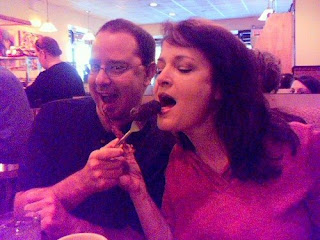Notes From a Compassionate Helper
Okay. So that may be an overstatement, or downright misleading. Sue me. At least I didn't call myself a codependent people pleaser (and you'd better not fall into that category, either).
You're getting your writing pep talk from a cave-like hotel room near Times Square and I'm a tad claustrophobic, if that tells you anything. The topic is helping yourself as a writer and I'm not talking about getting enough rest or balancing diet and exercise. I'm talking about being...
Realistic.
You've got your manuscript, and you've edited the shit out of it. Every line is free of adverbs (unless you're writing romance), you've replaced the dialogue attributions with beats of actions (where appropriate), the plot is dense as cheesecake, rather than that other holey metaphor and your characters are fatty and fleshed out without a hint of Mary Sueness. It can't help but sell, right?
Wrong. *ahem* This is going to sound harsh. Brace yourself.
Familiarize yourself with rejection. Think of it as a hug from the agents and editors to whom you send your manuscript. Especially if they personalize the rejection, take that advice as gold. Don't question it. You don't know anything. You're book is not a precious flower. Your ideas are regurgitated. These are facts. The sheer amount of manuscripts that flood the publishing houses assure that.
So...what can you do?
1. Make a decision. Are you writing for yourself or others? Is this a hobby or a career? That last one was a trick, career writing is a long way off for most writers. Figure on needing a real job. The decision you're going to need to make is whether you're serious.
2. Get a writing group/critique partner. If you are serious about this writing stuff, get yourself a writer's group where people don't hold back and call you on your bullshit. Groups are awesome. If you're only getting critical feedback from the people who love you, then you have no right to be shocked when the form rejections come in.
3. Go to readings/signings. Talk to your favorite authors. Most of them will be more than happy to answer your newbie questions. Plus, if you're going to see authors in a specific genre, you'll start to meet other aspiring writers (prospective group members, eh?).
4. Go to a writer's conference. Not only can you network at these "pitch parties" there are panels galore and classes to help you understand the ins and outs of the publishing business. And it is a BUSINESS. You're book is not art, it is product.
5. Ready, set, READ! And not just books on writing. Read the best of your genre and other genres. Read a lot! Every time you turn on the TV, you could be training your brain to understand the story structure, characterization and plotting of authors who are successful.
And I'm spent....
**Tosses laptop to ground. Handler squirts water on sweaty face**
You're getting your writing pep talk from a cave-like hotel room near Times Square and I'm a tad claustrophobic, if that tells you anything. The topic is helping yourself as a writer and I'm not talking about getting enough rest or balancing diet and exercise. I'm talking about being...
Realistic.
You've got your manuscript, and you've edited the shit out of it. Every line is free of adverbs (unless you're writing romance), you've replaced the dialogue attributions with beats of actions (where appropriate), the plot is dense as cheesecake, rather than that other holey metaphor and your characters are fatty and fleshed out without a hint of Mary Sueness. It can't help but sell, right?
Wrong. *ahem* This is going to sound harsh. Brace yourself.
Familiarize yourself with rejection. Think of it as a hug from the agents and editors to whom you send your manuscript. Especially if they personalize the rejection, take that advice as gold. Don't question it. You don't know anything. You're book is not a precious flower. Your ideas are regurgitated. These are facts. The sheer amount of manuscripts that flood the publishing houses assure that.
So...what can you do?
1. Make a decision. Are you writing for yourself or others? Is this a hobby or a career? That last one was a trick, career writing is a long way off for most writers. Figure on needing a real job. The decision you're going to need to make is whether you're serious.
2. Get a writing group/critique partner. If you are serious about this writing stuff, get yourself a writer's group where people don't hold back and call you on your bullshit. Groups are awesome. If you're only getting critical feedback from the people who love you, then you have no right to be shocked when the form rejections come in.
3. Go to readings/signings. Talk to your favorite authors. Most of them will be more than happy to answer your newbie questions. Plus, if you're going to see authors in a specific genre, you'll start to meet other aspiring writers (prospective group members, eh?).
4. Go to a writer's conference. Not only can you network at these "pitch parties" there are panels galore and classes to help you understand the ins and outs of the publishing business. And it is a BUSINESS. You're book is not art, it is product.
5. Ready, set, READ! And not just books on writing. Read the best of your genre and other genres. Read a lot! Every time you turn on the TV, you could be training your brain to understand the story structure, characterization and plotting of authors who are successful.
And I'm spent....
**Tosses laptop to ground. Handler squirts water on sweaty face**


Comments